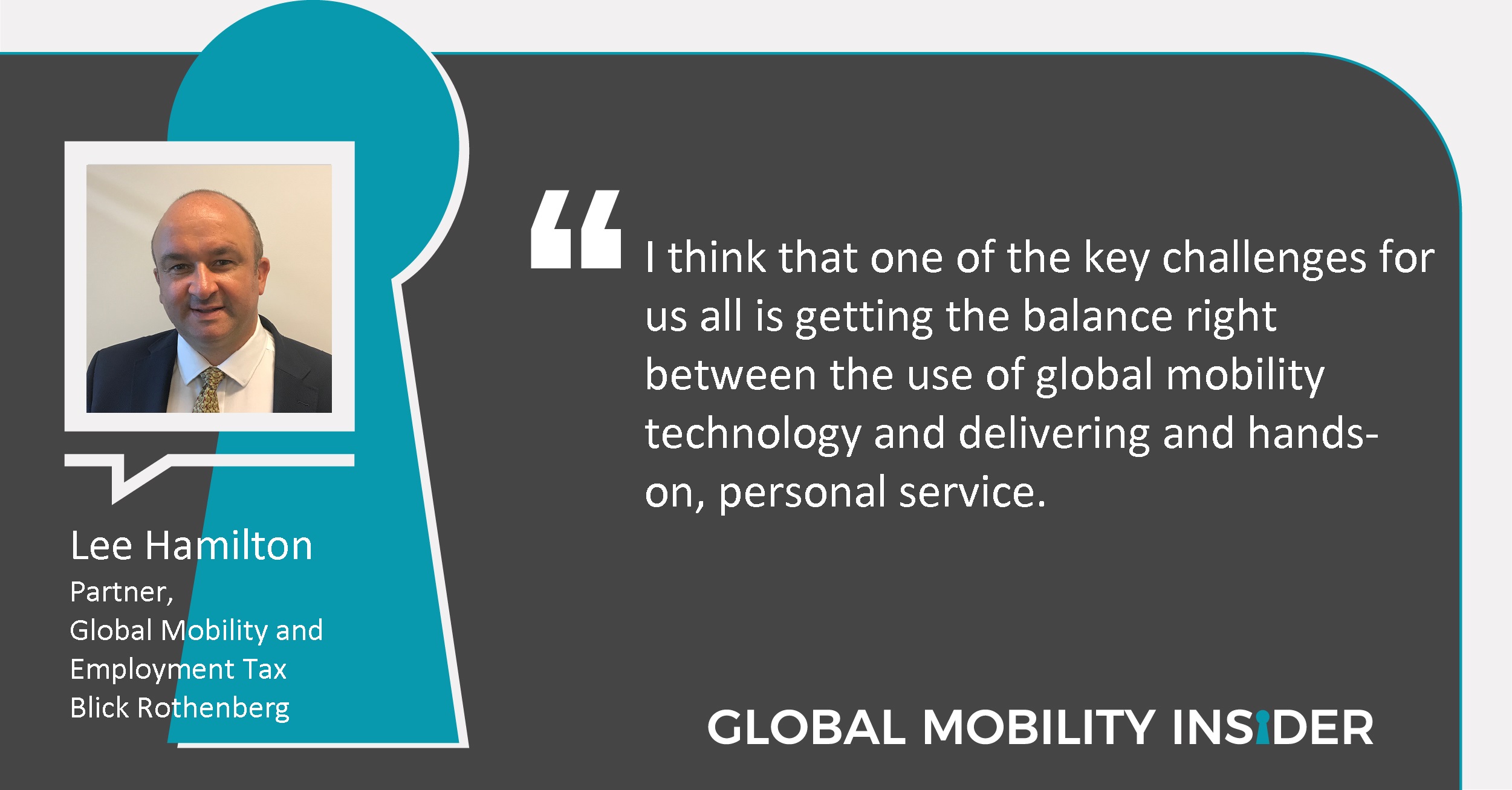Lee Hamilton - Partner, Global Mobility and Employment Tax - Blick Rothenberg
Name: Lee Hamilton
Position: Partner, Global Mobility and Employment Tax
Company: Blick Rothenberg

Professional Background
Blick Rothenburg, Partner, Global Mobility and Employment Tax (United Kingdom): 2017 – Present
Crowe Clark Whitehill, Director International Mobility Services (United Kingdom): 2013 – 2017
RSM Tenon, Director (United Kingdom): 2010 – 2013
PwC, Senior Manager (United Kingdom): 2006 – 2009
PwC, Manager/Consultant (United Kingdom): 2001 – 2006
Career Insider
Q: Why expatriate and global tax, and how did you get started in the industry?
A: Since spending part of my youth in Italy (my dad was based there in the Royal Air Force), I have been fascinated by different cultures, languages and people internationally. When it came to choosing a career, expatriate tax seemed ideal. At the same time, expatriate tax can bring complexity and I have always enjoyed the challenge of understanding an issue or technical matter and then explaining it in a straightforward and practical way.
Click & Like on LinkedIn
Q: What aspect of your work at Blick Rothenberg do you find most exciting?
A: Working with a progressive and forward looking firm, I am most excited about developing ideas and solutions that will help our clients solve practical issues and that make a real difference. For example, I have really enjoyed implementing our own state of the art technology solution to help employers to be tax compliant globally when it comes to short term business visitors.
Q: What advice would you give to someone looking to build a career in global mobility tax?
A: Get a good mentor as soon as you can. I have benefitted hugely over the years from the advice and support of some key people who have made a huge difference to me and my career. It need not always be a longstanding relationship but just someone you trust who can act as a sounding board and can provide you with guidance and challenge when you need it.
Industry Insider
Q: How do you think the taxation landscape for global mobility has changed over the years?
A: I think the most significant change for me to the global mobility landscape over the past 20 years is the proliferation in cross border working in small and medium sized employers. With advances in communication, reduced travel costs and globalisation generally, working internationally has become commonplace, even in new start-ups and very small businesses. Alongside this and for the same reasons, I have also seen a marked increase in short term business travel generally.
Q: What aspect of expatriate tax is likely to keep you up at night?
A: Whilst expatriate tax would not typically keep me up at night, the area that I am currently giving most thought to is the taxation of short-term business visitors. Whilst, technically, it is not too complex, the practical application of the rules can prove difficult for employers, not least those who are small and who may struggle with resources to comply in this area. My aim is to make compliance in this area easier for such employers, both through the use of technology and fit for purpose policies and processes.
Q: What is the most important strategic tip you can give to companies handling global tax issues?
A: Quite simply, to develop a plan and don’t leave this area in the “too difficult box”. Whether you are a small company with a few globally mobile employees or a larger employer with many, it invariably saves time, cost and effort to understand the personal and employment tax implications up-front. This enables a clear plan to be developed and means that all stakeholders involved in mobility (HR, payroll, finance, the expatriate) are clear on the position from the outset. Without a plan, things can quickly go awry, and problems are inevitably harder to unpick and correct after they have happened.
Visionary Insider
Q: How can global mobility taxation practices get better in the next 5 years?
A: I think that one of the key challenges for us all is getting the balance right between the use of global mobility technology and delivering and hands-on, personal service. The experience of some employers is that some practices are relying too much on global mobility technology, becoming remote and impersonal. Conversely, firms without any technology can struggle to support employers effectively, especially in areas which rely heavily on the contemporaneous tracking and reporting of globally mobile employees (e.g. short-term business visitors). At Blick Rothenberg, for example, we remain focused on delivering a personal service, whilst introducing global mobility technology where it is of direct benefit to our clients.
Q: What more can be done to benefit global talents on the move?
A: For me, the key is continually evaluating how global talent is nurtured and supported and a key element of this, in my view, should be seeking the input of the individuals themselves, both for macro trends across all industries and also, at a company level, the input of the specific talent pool within a company. My perception is that, sometimes, the needs of individuals get lost (or at least are not as prominent as they should be) when it comes to implementing changes, new ideas, new technology etc.
Q: What are the major developments you currently see happening in the industry, and how do you feel about them?
A: Like in many industries, I think the clear trend is towards greater automation and use of technology, both by governments and also service providers. As an advisor, I think this is a positive trend and I welcome it, provided that it is deployed appropriately and we do not lose essential things in the process such as the ability and skills to develop relationships and deliver a personal service.
When I started out in tax, clients would sometimes call and ask what the tax rates were in certain overseas countries and would seek other similar information. Nowadays, such information can often be easily ‘Googled’. Again, I think this advance is positive and it means that our clients now mainly look to us to provide advice on complex matters, to draw on our experience and to really think about them and their circumstances. For these reasons, developing relationships and delivering a personal service will remain essential in my view since technology can’t replicate these things (at least yet!).
Either/Or…
- Short-term or long-term assignment? Short-term
- Airbnb or serviced apartments? Serviced apartments
- Excel or global mobility software? Global mobility software
- Lump-sum or flex-ben? Flex-ben
- Facebook or LinkedIn? LinkedIn
- Outlook or Gmail? Outlook
- Taxi or Uber? Uber
- iOS or Android? iOS
- Mac or PC? PC
- Computer or tablet? Tablet
- Work hard or play hard? Work Hard


Leave a Comment
* Fields marked with this asterisk are mandatory.